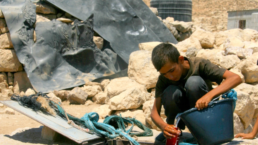The Hague can only prosecute four types of crimes. Ecocide could become the fifth.
by Lylla Younes, Grist
When reports emerged in late December that the Israeli military planned to pump seawater into the underground tunnel networks used by Hamas fighters in Gaza, scientists and advocates around the world raised alarm over the prospect of an environmental disaster. Flooding the tunnels threatened to permanently salinate the land, making it impossible to cultivate crops. Seawater could also seep underground and into an aquifer that the majority of Gazans rely on for water. Palestinian rights groups and protesters around the world were already accusing the Israeli government of committing genocide against the Palestinians, with more than 20,000 killed by Israeli bombings on Gaza since Hamas’ attack on southern Israel last October. Now, another term entered the conversation: ecocide.
Broadly defined as the severe, widespread, and long-term destruction of the environment, ecocide isn’t considered a crime under international law. At the moment, the only way to prosecute vast environmental destruction internationally is as a war crime in the International Criminal Court, or ICC, based in The Hague, Netherlands. But a growing number of countries, advocates, and legal experts are trying to change that. While some, like representatives from the island nation of Vanuatu, are motivated by the escalating climate crisis, and others, like Ukraine, are more interested in prosecuting environmental war crimes, they ultimately share the same goal: making ecocide the fifth international crime the ICC could prosecute, along with crimes against humanity, war crimes, crimes of aggression, and genocide.

Their campaign reached a major milestone in 2021, when a panel of legal experts worked over six months to create a legal definition of ecocide. Afterward, a number of countries and the European Union incorporated at least part of this definition into new legislation, which, experts said, increases the likelihood that it will eventually be adopted by the International Criminal Court. While there are plenty of obstacles to making such a law effective, advocates interviewed for this story said that the symbolic importance could have far-reaching consequences. Creating a law against ecocide could eventually force government officials and corporate executives to think twice before polluting rivers, poisoning the air, or destroying the land.
Recent Posts
Militarized Immigration Enforcement Incompatible With Democracy
February 1, 2026
Take Action NowICE’s targeting of virtually anyone who is not white and English-speaking — including, ironically, Native Americans — exposes this…
Trump’s Back-and-Forth Threats on Iran Are Psychological Warfare
January 31, 2026
Take Action NowAs Trump threatens Iran yet again, Congress continues to abdicate its responsibility to rein in war.By Hanieh Jodat, Truthout As…
U.S. Media Keen on Iranian Unrest—Less So on U.S. and Israel’s Role in It
January 30, 2026
Take Action Now Democrats have a rare moment of leverage to pass legislation ending qualified immunity for Immigration and Customs Enforcement…
The Senate Must Not Fund ICE, A Zero Hour Conversation With Sonali Kolhatkar
January 30, 2026
Take Action Now “We’ve seen a really sharp change in how the public views immigration enforcement, particularly ice, to the point where…




